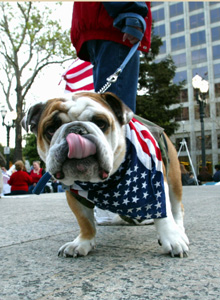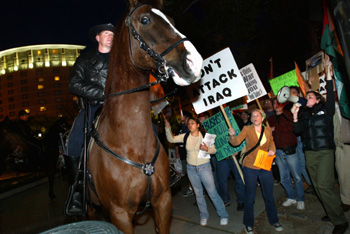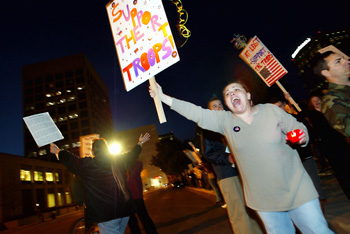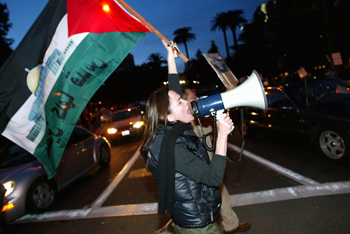![[Metroactive News&Issues]](/gifs/news468.gif)
[ Silicon Valley | Metroactive Home | Archives ]

Photographs by George Sakkestad Citizen Canine: Protests hit San Jose streets almost every day last week, including a large gathering at Plaza de Cesar Chavez on Thursday, and at the intersection of San Carlos and Second streets, where several hundred people demonstrated at noon and later at 5pm. Middle Grounded Will the latest wave of protesters get Middle America to board the peace train? By Traci Hukill CONSIDER the difference between two antiwar demonstrations that took place last week in Washington, D.C.: On Wednesday, March 19, the night the war began, a half-dozen wailing women in pink, wearing gruesome war-victim makeup and mock bandages, led a crowd of 200 protesters to the Kalorama home of Defense Secretary Donald Rumsfeld about a mile away. They managed to stop rush-hour traffic en route, engaged in a brief skirmish with police in which a young man was arrested and presented a child-sized coffin made of Styrofoam to a two-story brick house. "Donald Rumsfeld!" shouted Medea Benjamin. "Shame on you! You've got the blood of Iraqi civilians on your hands!" A cry went up from the demonstrators. Some were already lying down, staging a die-in on the street. The two dozen D.C. cops and security police lined up in front of the house gave each other looks. "Donald, come get this casket! How are you going to sleep at night knowing this war is immoral, unjust and illegal?" When the group turned to leave 45 minutes later, Benjamin propped up the Styrofoam coffin on the roof of a silver Impala parked in front of the house. It was Code Pink at its best--vocal, theatrical and radical, staging the kind of event that students love but parents roll their eyes at. The following Saturday, after U.S. forces had shocked and awed Baghdad and the rest of the world with a brutal all-night pummeling, a rather more august group of speakers took turns at the podium in the chapel at American University to denounce Bush's doctrine of pre-emptive war. A Nobel Peace Prize winner, retired military officers, Vietnam veterans, former intelligence agents, scholars, celebrated leakers of Pentagon Papers--one by one they laid out their arguments in the language and environment of the academy. Here, too, the audience of 250 or so was composed mostly of students, and they erupted into rowdy applause, especially when John Brown, the diplomat who tendered his resignation to the State Department last week over objections to the war, took the stage.
But this time the C-SPAN cameras were rolling. And while protesters by the thousands get arrested in San Francisco and elsewhere, and Code Pink keeps beating its drum to rally the young and the progressive, it is this movement, the one gaining momentum among the middleweights of the political and military establishment, that has the greatest potential to put mainstream America on board the antiwar wagon. This particular part of the antiwar movement has as its unofficial centerpiece a very official document: the National Security Strategy, released by the White House in September 2002. Its summary contains this paragraph: "We will cooperate with other nations to deny, contain and curtail our enemies' efforts to acquire dangerous technologies. And, as a matter of common sense and self-defense, America will act against such emerging threats before they are fully formed. We cannot defend America and our friends by hoping for the best. So we must be prepared to defeat our enemies' plans, using the best intelligence and proceeding with deliberation. History will judge harshly those who saw this coming danger but failed to act. In the new world we have entered, the only path to peace and security is the path of action." It was the emergence of this manifesto prescribing pre-emptive military action, one year after 9/11, that spurred Gulf War veterans Charles Sheehan-Miles, Erik Gustafson, Erin Cole and Dan Fahey to form Veterans for Common Sense, a primary organizer of the teach-in at American University. Two weeks ago, VCF sent a letter to President Bush objecting to the war. It was signed by more than 1,000 veterans, among them two vice admirals, a brigadier general and a handful of colonels.
"The White House policy is frightening, and it basically spells out empire for the U.S. I don't know what else to call it," says Sheehan-Miles. "This is such a dramatic change in what American foreign policy is all about, that we should be having a huge public debate about it. And we're not." Coming from a combat veteran, Sheehan-Miles' words might carry extra weight for the 76 percent of Americans who reportedly support the war. But if Sheehan-Miles, who left the Army as a conscientious objector after his unit's killing of undefended Iraqis left him badly shaken, isn't convincing enough for Middle America, there's always Ret. Rear Adm. Gene LaRocque. LaRocque survived the destruction of his ship at Pearl Harbor to fight in World War II and command a nuclear-armed carrier task force during the Cold War. Later he was a planner in the Pentagon.
On Saturday, LaRocque stood at the microphone in full Navy regalia and in mild, avuncular tones excoriated those who would cast aspersions on the right to dissent in wartime, the burgeoning militarism taking root here and the nation's "pride and joy" in its precision weapons. And he criticized one of the main principles enshrined in the Bush doctrine: that it is America's "responsibility to lead" the rest of the world to freedom. "Is it the sole responsibility of the U.S. to decide which nations' form[s] of government will stand and which will fall?" he asked. "Is it the responsibility of the U.S. to kill or destroy to bring about a change of government? I think not. I don't believe George Bush has the right to kill one person to bring about a change in government." LaRocque was inspiringly set up by Bobby Muller, president of the Vietnam Veterans of America Foundation. A Marine lieutenant in Vietnam, Muller took a bullet that severed his spinal cord and left him paralyzed from the chest down. "This is only the beginning," he told the crowd. "Iraq will be over in a few days. The problem is an ideology that is controlling this administration. It has to do with how you look at the world and America's role in the world. It's called the Bush doctrine."
Send a letter to the editor about this story to letters@metronews.com. [ Silicon Valley | Metroactive Home | Archives ]
|
From the March 27-April 2, 2003 issue of Metro, Silicon Valley's Weekly Newspaper.
Copyright © Metro Publishing Inc. Metroactive is affiliated with the Boulevards Network.
For more information about the San Jose/Silicon Valley area, visit sanjose.com.


